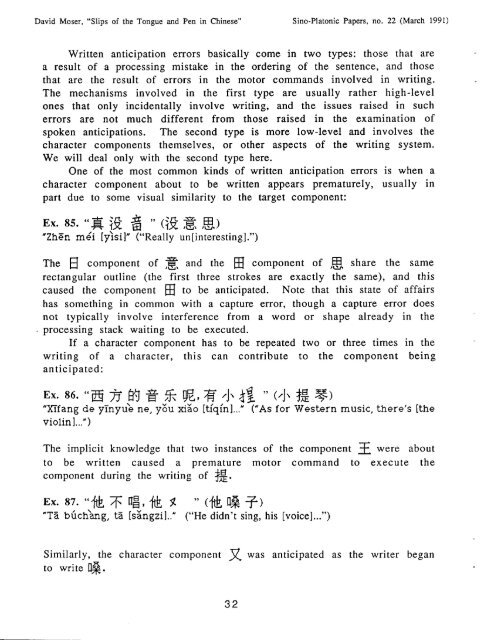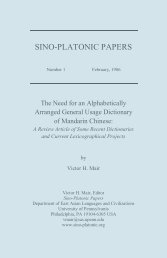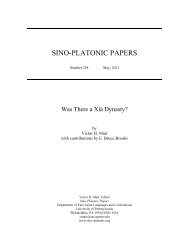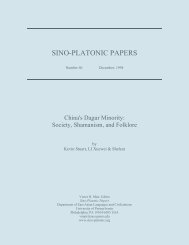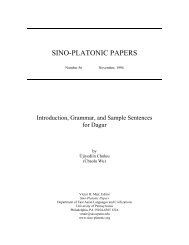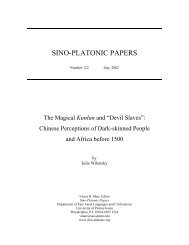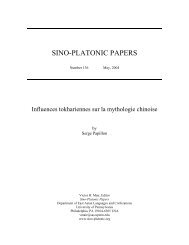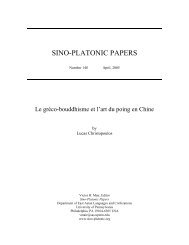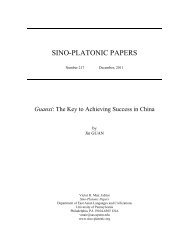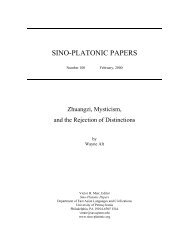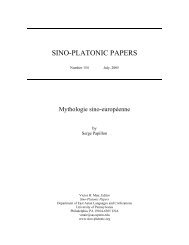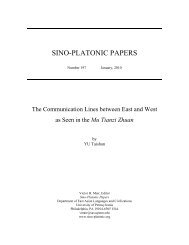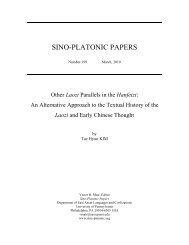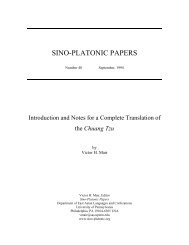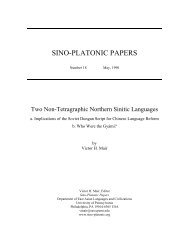Slips of the Tongue and Pen in Chinese - Sino-Platonic Papers
Slips of the Tongue and Pen in Chinese - Sino-Platonic Papers
Slips of the Tongue and Pen in Chinese - Sino-Platonic Papers
You also want an ePaper? Increase the reach of your titles
YUMPU automatically turns print PDFs into web optimized ePapers that Google loves.
David Moser, "<strong>Slips</strong> <strong>of</strong> <strong>the</strong> <strong>Tongue</strong> <strong>and</strong> <strong>Pen</strong> <strong>in</strong> Ch<strong>in</strong>ese" S<strong>in</strong>o-<strong>Platonic</strong> <strong>Papers</strong>, no. 22 (March 199 1)<br />
Written anticipation errors basically come <strong>in</strong> two types: those that are<br />
a result <strong>of</strong> a process<strong>in</strong>g mistake <strong>in</strong> <strong>the</strong> order<strong>in</strong>g <strong>of</strong> <strong>the</strong> sentence, <strong>and</strong> those<br />
that are <strong>the</strong> result <strong>of</strong> errors <strong>in</strong> <strong>the</strong> motor comm<strong>and</strong>s <strong>in</strong>volved <strong>in</strong> writ<strong>in</strong>g.<br />
The mechanisms <strong>in</strong>volved <strong>in</strong> <strong>the</strong> first type are usually ra<strong>the</strong>r high-level<br />
ones that only <strong>in</strong>cidentally <strong>in</strong>volve writ<strong>in</strong>g, <strong>and</strong> <strong>the</strong> issues raised <strong>in</strong> such<br />
errors are not much different from those raised <strong>in</strong> <strong>the</strong> exam<strong>in</strong>ation <strong>of</strong><br />
spoken anticipations. The second type is more low-level <strong>and</strong> <strong>in</strong>volves <strong>the</strong><br />
character components <strong>the</strong>mselves, or o<strong>the</strong>r aspects <strong>of</strong> <strong>the</strong> writ<strong>in</strong>g system.<br />
We will deal only with <strong>the</strong> second type here.<br />
One <strong>of</strong> <strong>the</strong> most common k<strong>in</strong>ds <strong>of</strong> written anticipation errors is when a<br />
character component about to be written appears prematurely, usually <strong>in</strong><br />
part due to some visual similarity to <strong>the</strong> target component:<br />
3 9,<br />
Ex* 85- ''g * ($2 g ,%)<br />
"Zhgn me'i [yisi I" ("Really un[<strong>in</strong>terest<strong>in</strong>g] .")<br />
The El component <strong>of</strong> g, <strong>and</strong> <strong>the</strong> component <strong>of</strong> ,g share <strong>the</strong> same<br />
rectangular outl<strong>in</strong>e (<strong>the</strong> first three strokes are exactly <strong>the</strong> same), <strong>and</strong> this<br />
caused <strong>the</strong> component a to be anticipated. Note that this state <strong>of</strong> affairs<br />
has someth<strong>in</strong>g <strong>in</strong> common with a capture error, though a capture error does<br />
not typically <strong>in</strong>volve <strong>in</strong>terference from a word or shape already <strong>in</strong> <strong>the</strong><br />
- process<strong>in</strong>g stack wait<strong>in</strong>g to be executed.<br />
If a character component has to be repeated two or three times <strong>in</strong> <strong>the</strong><br />
writ<strong>in</strong>g <strong>of</strong> a character, this can contribute to <strong>the</strong> component be<strong>in</strong>g<br />
anticipated:<br />
.J\<br />
Ex* 86. &&;ei ij IyJ 8 5 El ;fs 4% ,y<br />
"Xifang de y<strong>in</strong>yu\e ne, y6u xigo [tiq<strong>in</strong>]<br />
viol<strong>in</strong> I...')<br />
(.J\ t: F)<br />
...' ("As for Western music, <strong>the</strong>re's [<strong>the</strong><br />
The implicit knowledge that two <strong>in</strong>stances <strong>of</strong> <strong>the</strong> component 5 were about<br />
to be written caused a premature motor comm<strong>and</strong> to execute <strong>the</strong><br />
component dur<strong>in</strong>g <strong>the</strong> writ<strong>in</strong>g <strong>of</strong> $g.<br />
Ex. 87. "f&F ag,f& " (B @ 3<br />
"Ta bfich'mg, t3 [sgngzi I..' ("He didn't s<strong>in</strong>g, his [voice] ...")<br />
Similarly, <strong>the</strong> character component was anticipated as <strong>the</strong> writer began<br />
to write @.


